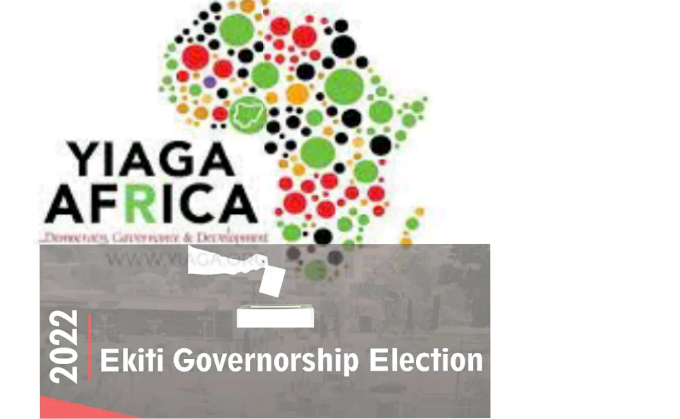Yiaga Africa, a Civil Society Organisation (CSO), says the Ekiti governorship election result announced by the Independent National Electoral Commission (INEC) falls within its Parallel Vote Tabulation (PVT).
Mr Ezenwa Nwagwu, Board Member, Yiaga Africa, made this known in the group’s final verification statement on the Ekiti election on Sunday in Abuja.
“The INEC result falls within Yiaga Africa’s Parallel Vote Tabulation (PVT) which is an election observation methodology based on a representative random sample of polling stations and is employed for independent verification,” he said.
Nwagwu said that Yiaga Africa deployed 500 observers in pairs to a representative random sample of 250 polling units and 25 mobile observers in all the 16 Local Government Areas (LGAs) among others.
He said that the deployment strategy enabled the organisation to provide timely and accurate information on the election day process beginning from the set-up, voter accreditation, voting, and counting to independently verifying the result.
“The process and results verification statement is based on reports from 245 to 250 (98 per cent) sampled polling units in Ekiti State.
“Based on report of the sampled polling units, Yiaga Africa’s statistical analysis shows that the All Progressives Congress (APC) should receive between 50.5 per cent and 54.1 per cent of the vote.
“The Peoples Democratic Party (PDP) should receive between 19.0 per cent and 22.4 per cent of the vote, Social Democratic Party (PDP) should receive between 20.4 per cent and 24.6 per cent of the vote.
“No other political party should receive more than 5.5 per cent of the vote. The PVT statistical analysis is based on the number of registered voters and not the number of Permanent Voter Cards (PVCs) collected,” he said.
Nwagwu said that with this, INEC official results for the 2022 Ekiti state governorship election was consistent with Yiaga Africa’s because it fell within its estimated range.
He said that had the official results been changed at the ward, LGA or state collation centres, the official results would not have fallen within the Yiaga Africa estimated ranges.
“This is because the official results fall within the estimated ranges, candidates, parties, and voters should have confidence that the official results for the Ekiti 2022 gubernatorial election reflect the ballots cast at polling units on Saturday, June 18,” he said.
Nwagwu said that it was important to highlight that the counting process at polling units was transparent and included representatives from the four political parties that received the most votes.
“At 100 per cent of polling units, an APC party agent signed the EC.8A results form, at 99 per cent of polling units a PDP party agent signed the EC.8A results form and at 97 per cent of polling units an SDP party agent signed the EC.8A results form.
“At 99 per cent of polling units, APC party agents were given a copy of the EC.8A results form, at 97 per cent of polling units, PDP polling agents were given a copy of the EC.8A results form and at 96 per cent of polling units, SDP party agents were given a copy of the EC.8A results form.
“While at 96 per cent of polling units, the polling official posted the official polling unit results for the public to see,” he said.
Nwagwu said that INEC turnout and rejected ballots for the 16 LGAs were also consistent with Yiaga Africa’s estimate.
He added that the organisaition was able to estimate that turnout was between 35.7 per cent and 38.7 per cent while INEC’s official result was 36.47 per cent.
Similarly, he said that Yiaga Africa’s estimated rejected ballots were between 1.8 per cent and 2.6 per cent while INEC official result was 2.46 per cent.
The organisation encouraged INEC to uphold the principles of transparency by publishing the total number of PVCs collected in Ekiti state on its website.
“In addition, Yiaga Africa calls on INEC to audit the newly created polling units and ensure equitable distribution of voters to the polling units.
“In cases where voters have been allotted to new polling units, INEC should update the voter records on its website and communicate the changes to prevent voter disenfranchisement.”
The organisation commended the electorate in Ekiti state for their resilience and commitment to a non-violent election.
It also urged them to sustain their participation in the electoral process beyond the election by holding political parties accountable for their campaign promises.
